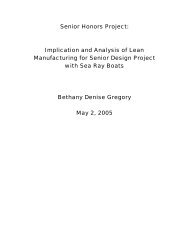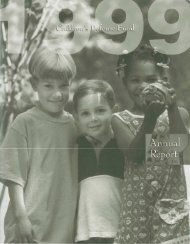child care - Digital Library Collections
child care - Digital Library Collections
child care - Digital Library Collections
You also want an ePaper? Increase the reach of your titles
YUMPU automatically turns print PDFs into web optimized ePapers that Google loves.
THE STATE OF AMERICA'S CHILDREN YEARBOOK 1998<br />
Childhood Development (ECD) Initiative aims to<br />
broaden the commitment to and responsibility for<br />
early <strong>child</strong>hood education. Participants, who work<br />
as volunteers, include representatives from the<br />
United Way, the city and county governments, the<br />
Chamber of Commerce, the Catholic diocese of<br />
Rochester, and local foundations. Every year they<br />
review local needs, gaps in service, and available<br />
resources and then collaborate on solutions. Public<br />
and private dollars go toward three broad efforts:<br />
( I) making <strong>child</strong> <strong>care</strong> more affordable and available<br />
by supporting more <strong>child</strong> <strong>care</strong> subsidies and higher<br />
reimbursement rates for providers; (2) expanding<br />
supply by creating new <strong>child</strong> <strong>care</strong> facilities, family<br />
learning and resource centers, and a home instruction<br />
program for preschool students; and (3) improving<br />
quality through the accreditation of more<br />
<strong>child</strong> <strong>care</strong> centers and family <strong>child</strong> <strong>care</strong> homes,<br />
educational scholarships for staff, a public awareness<br />
campaign about the importance ofgood early<br />
<strong>child</strong>hood education, and new associations to bring<br />
the arts into <strong>child</strong> development programs and science<br />
and technology into the preschool curriculum.<br />
Recently, the ECD initiative took on a new<br />
task to help Rochester effectively use its share of<br />
state funds for New York's prekindergarten program.<br />
The participants in the initiative convened a<br />
committee to develop an initial prekindergarten<br />
plan for the school district. Because the district<br />
faces a shortage of classroom space but wants to<br />
reduce class size, the committee recommended using<br />
space that the ECD initiative previously helped<br />
develop in community <strong>child</strong> <strong>care</strong> and Head Start<br />
facilities. The committee also proposed a partnership<br />
with the school district that would give the<br />
initiative a pivotal role in launching and running<br />
the prekindergarten program.<br />
Corporate involvement in Texas. In Fort Worth,<br />
Texas, 10 companies have made a three-year commitment<br />
to the Corporate Champions program.<br />
Companies have not only donated funds totaling<br />
$360,000 but have also pledged the involvement of<br />
a high-level executive. The money supports equipment<br />
grants for <strong>child</strong> <strong>care</strong> centers, scholarships for<br />
family <strong>child</strong> <strong>care</strong> providers working toward accredi-<br />
tation, resource and referral services for member<br />
companies' employees, training for <strong>child</strong> <strong>care</strong> workers,<br />
work-family seminars, and the development<br />
and distribution of materials promoting highquality<br />
<strong>child</strong> <strong>care</strong> and family-friendly work policies.<br />
Moving Forward: A 1998 Agenda<br />
for Action<br />
Three ongoing developments provide a powerful<br />
impetus for action on <strong>child</strong> <strong>care</strong> issues:<br />
escalating work requirements for families on<br />
welfare, increasing awareness of the importance of<br />
the fIrst three years of life, and growing concern<br />
about school-age <strong>child</strong>ren left home alone. In 1998<br />
we must move forward with new strategies and<br />
investments ensuring that parents have reliable<br />
<strong>child</strong> <strong>care</strong>, that infants and toddlers get the nurturing<br />
and stimulation they need for future learning,<br />
that older <strong>child</strong>ren have after-school activities that<br />
keep them out oftrouble and help them succeed in<br />
school, and that parents who wish to stay home<br />
during their <strong>child</strong>ren's early years have the opportunity<br />
and support to do so.<br />
We can meet these goals only through partnerships<br />
that draw together resources from the public<br />
and private sectors. In 1998 a broad-based coalition<br />
will be working at all levels-federal, state, and<br />
local-to expand the <strong>child</strong> <strong>care</strong> options of American<br />
families.<br />
At the federal level, advocates should:<br />
• Lobby for a guaranteed $20 billion to the states<br />
over fIve years to strengthen the quality of<br />
<strong>child</strong> <strong>care</strong> for all families and make <strong>child</strong> <strong>care</strong><br />
more affordable. Improving the quality and<br />
availability of <strong>care</strong> for <strong>child</strong>ren under 3 and<br />
<strong>child</strong>ren of school age should be a special priority,<br />
given the alarming gaps in the quality and<br />
supply of<strong>care</strong> for these groups.<br />
• Campaign to reauthorize Head Start with<br />
more funds targeted to infants and toddlers<br />
and additional funds to move Head Start toward<br />
serving all eligible <strong>child</strong>ren who need it.<br />
• Support an extension of the Family and Medical<br />
Leave Act to cover all employers with 25 or<br />
46 CHI L D R EN'S D E FEN S E FUN D














